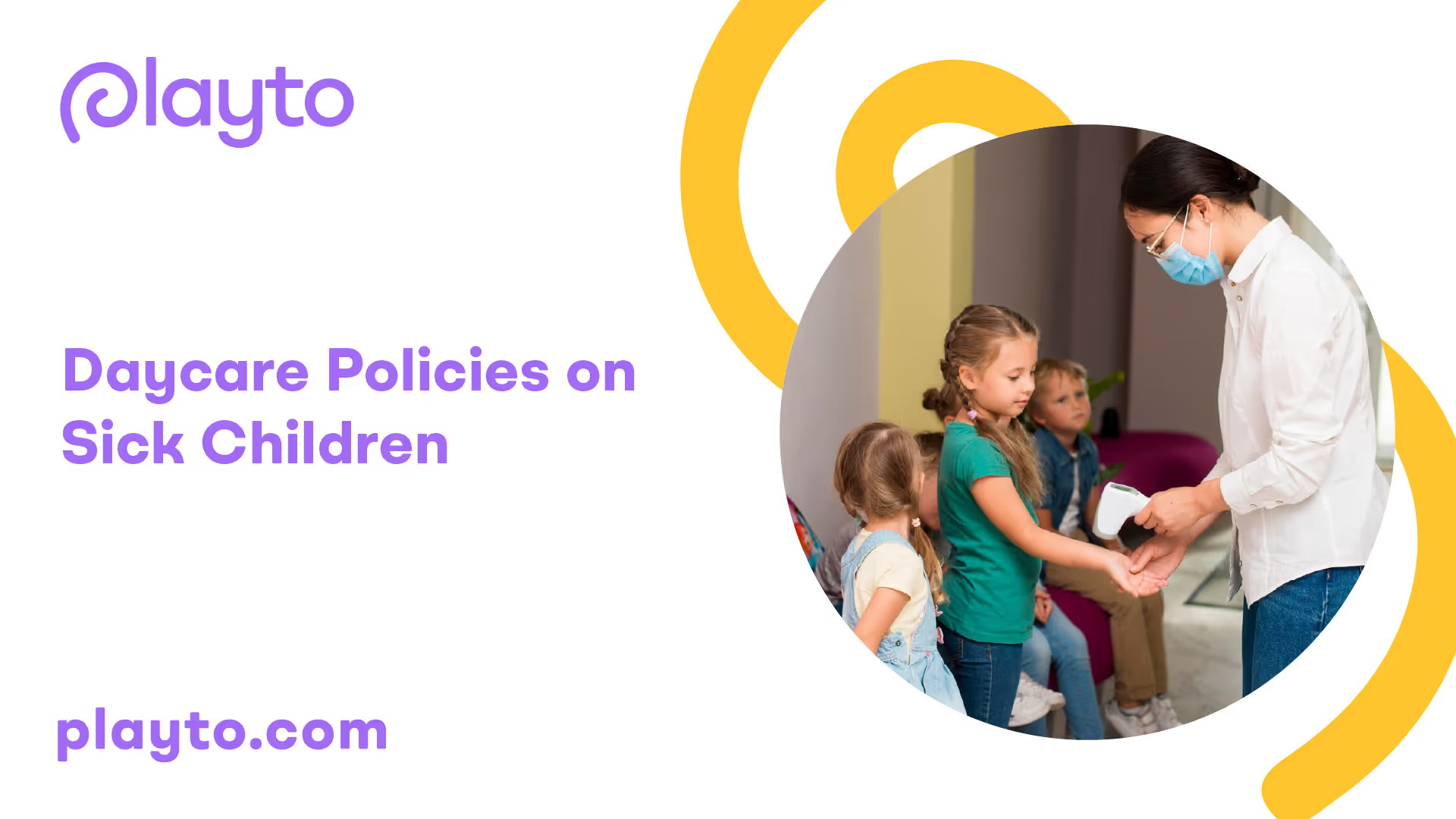
Understanding Daycare Sick Policies
When it comes to daycare centers, having clear and comprehensive sick policies is of utmost importance. These policies help childcare providers avoid the spread of infectious diseases, maintaining a healthy environment for staff, children, and families. By implementing effective sick policies, daycare centers can ensure that sick children receive appropriate care and rest without compromising the health of others, especially those with fragile immune systems like infants and the elderly.
Importance of Daycare Sick Policies
A daycare sickness policy serves several vital purposes. Firstly, it helps prevent the spread of contagious diseases within the daycare, minimizing the risk of outbreaks and increased absenteeism among children and staff. It also protects the well-being of children by ensuring they are not exposed to potentially harmful illnesses. Additionally, having clear sick policies helps parents understand when to keep their child at home and the criteria for returning to the daycare. This promotes transparency and effective communication between parents and daycare providers.
To maintain a safe and healthy environment, daycare centers should include detailed sick policies in their family handbooks. These policies should clearly outline when children should be kept at home due to illness, the procedures for handling different ailments, and the steps for returning to the center after an illness. It is crucial to update these policies regularly to comply with state regulations and accommodate new infectious diseases like COVID-19 [1].
Compliance with State Regulations
Childcare health requirements vary by state, so it is essential for daycare centers to comply with state rules when developing their sick policies. State regulations may specify guidelines for exclusions due to specific illnesses, vaccination requirements, and reporting procedures. By staying up to date with state regulations, daycare centers can ensure that their sick policies align with the latest health and safety standards.
Compliance with state regulations also helps daycare centers maintain the trust of parents and guardians. When parents choose a daycare center for their child, they expect that the center will prioritize their child's health and well-being. By adhering to state regulations and implementing effective sick policies, daycare centers can demonstrate their commitment to providing a safe and healthy environment for children.
By understanding the importance of daycare sick policies and complying with state regulations, daycare centers can create an environment that promotes the well-being and safety of children and staff. These policies lay the foundation for effective illness management, prevention of outbreaks, and clear communication with parents. In the following sections, we will explore specific procedures related to handling different ailments, daily health checks, comprehensive COVID-19 policies, return and communication guidelines, as well as ensuring health and safety through medication administration and hygiene protocols.

Specific Ailment Procedures
When it comes to daycare policies on sick children, it's crucial to have specific procedures in place for handling different ailments. This ensures the well-being and safety of all children in the daycare setting. In this section, we will discuss the procedures for handling vomiting and diarrhea, as well as managing fever and COVID-19.
Handling Vomiting and Diarrhea
Vomiting and diarrhea are common symptoms that require careful attention in a daycare setting. In general, if a child experiences vomiting or diarrhea, it is important to prevent the spread of infection to other children and staff members. According to Care.com, if diarrhea is accompanied by a fever, children should stay home from daycare. However, if the diarrhea is mild, contained in the diaper, and without significant drops of blood or mucus, they can go to daycare.
Daycare policies should outline the following procedures for handling vomiting and diarrhea:
- Exclusion Criteria: Clearly define the symptoms that require a child to stay home, such as persistent vomiting, severe diarrhea, or the presence of blood or mucus in the stool. This helps prevent the spread of contagious illnesses in the daycare facility.
- Parent Communication: Establish clear communication procedures for parents to notify the daycare staff if their child is experiencing vomiting or diarrhea. This allows the daycare to be aware of any potential illness and take necessary precautions.
- Cleaning Protocols: Outline proper cleaning procedures to ensure a hygienic environment. This includes disinfecting surfaces, toys, and any other items that may have come into contact with vomit or diarrhea.
By following these procedures, daycare centers can effectively address vomiting and diarrhea while maintaining a healthy and safe environment for all children.
Managing Fever and COVID-19
Fever is another common ailment that requires careful management in daycare settings. Daycare policies often include a fever limit, typically set at 100.4°F or higher, as outlined by Procare Software. Children with fevers are more likely to be contagious and should stay home until they have been fever-free for 24 hours without the use of fever-reducing medication.
In the context of the ongoing COVID-19 pandemic, it is essential for daycare centers to have specific procedures in place to manage fever and COVID-19 symptoms. These procedures may include:
- Exclusion Criteria: Clearly define the symptoms associated with COVID-19, such as fever, cough, difficulty breathing, loss of taste or smell, and fatigue. Children exhibiting these symptoms should stay home and follow appropriate medical advice.
- Parent Notification: Establish effective communication channels to notify parents of any suspected or confirmed cases of COVID-19 within the daycare facility. This allows parents to take necessary precautions and seek appropriate medical attention for their child.
- Preventive Measures: Outline preventive measures to reduce the risk of COVID-19 transmission in the daycare setting. This may include promoting hand hygiene, encouraging the use of face masks for older children and staff, implementing social distancing measures, and following guidance from local health authorities.
By implementing these specific procedures for managing fever and COVID-19 symptoms, daycare centers can play a vital role in preventing the spread of contagious illnesses and ensuring the health and safety of all children in their care.
When it comes to daycare policies on sick children, it is important to have comprehensive guidelines in place for various ailments. By clearly outlining procedures for handling vomiting and diarrhea, as well as managing fever and COVID-19, daycare centers can maintain a healthy and safe environment for all children and minimize the risk of contagious illnesses spreading within the facility.

Daily Health Checks
Ensuring the health and well-being of children in daycare settings involves implementing daily health checks. These checks help to monitor the overall health status of children and identify any potential illness symptoms before they can spread to others. This section will explore two essential aspects of daily health checks: morning health screenings and the utilization of health monitoring tools.
Morning Health Screenings
Many daycare centers include a morning health screening as part of their daycare sick policies. This screening is conducted for both children and staff before they enter the center. The purpose of the morning health screening is to assess the health status of individuals and identify any signs of illness.
During the morning health screening, children and staff may be asked questions about their current health, such as whether they are experiencing any symptoms like fever, cough, or runny nose. Additionally, temperature checks may be conducted to identify any fevers. These screenings are designed to be quick and efficient, ensuring that any potential illness is promptly addressed and appropriate measures are taken to prevent the spread of infection.
Utilizing Health Monitoring Tools
To streamline the process of daily health checks, many daycare centers employ health monitoring tools. These tools help in recording and tracking the health status of children and staff. One such tool is the daily health check feature provided by brightwheel. This feature allows for customization of health screen statements to fit the unique requirements of each program [1].
By utilizing health monitoring tools, daycare centers can efficiently collect and store health information, making it easier to track trends, identify recurring issues, and take appropriate action. Moreover, these tools can aid in maintaining accurate records, which may be required for compliance with state regulations.
Regular and thorough health checks are essential in daycare settings to ensure the well-being of all children and staff members. By implementing morning health screenings and utilizing health monitoring tools, daycare centers can promptly identify potential illness symptoms and take appropriate measures to maintain a healthy environment.
To further enhance the safety of children and prevent the spread of illness, daycare centers should also follow comprehensive daycare policies that address specific ailments, establish guidelines for return and communication, and outline protocols for medication administration and hygiene practices.
Comprehensive COVID-19 Policy
As the COVID-19 pandemic continues to impact our daily lives, daycare centers have implemented comprehensive policies to protect the health and safety of both the staff and the children in their care. These policies include exclusion criteria and preventative measures to minimize the risk of COVID-19 transmission within the daycare setting.
Exclusion Criteria
Daycare centers have established specific criteria for excluding children who exhibit symptoms of COVID-19 or have been in close contact with someone who has tested positive. The exclusion criteria may include:
- Fever: A child with a temperature above a certain threshold (such as 100.4°F or 38°C) may be excluded from daycare until the fever subsides [1].
- Respiratory Symptoms: Children experiencing symptoms such as cough, shortness of breath, or difficulty breathing may be required to stay home [2].
- COVID-19 Exposure: If a child has been in close contact with someone who has tested positive for COVID-19, they may be excluded from daycare for a designated period to monitor for symptoms and prevent potential spread.
It's important for daycare centers to communicate these exclusion criteria clearly to parents and caregivers, ensuring that everyone understands the importance of keeping symptomatic or exposed children away from the daycare environment. For more information on daycare policies regarding COVID-19, consult your specific daycare center's guidelines.
Preventative Measures
To mitigate the risk of COVID-19 transmission within daycare centers, various preventative measures are implemented. These measures may include:
- Vaccination: Encouraging staff and eligible children to receive COVID-19 vaccinations, in accordance with local health guidelines.
- Hand Hygiene: Promoting frequent handwashing for both staff and children, using soap and water for at least 20 seconds or using hand sanitizers with at least 60% alcohol content [3].
- Face Coverings: Requiring staff members and older children to wear face coverings, following local health department recommendations.
- Physical Distancing: Implementing strategies to maintain physical distance between children and staff, when possible, to reduce the risk of virus transmission.
- Enhanced Cleaning and Disinfection: Conducting regular cleaning and disinfection of high-touch surfaces, toys, and equipment, following guidelines from health authorities.
By combining these preventative measures and exclusion criteria, daycare centers aim to create a safe environment for children to learn and play while minimizing the risk of COVID-19 transmission. It's important for parents to stay informed about their daycare's specific policies and follow any guidelines provided to ensure the health and well-being of their children and the entire daycare community.
Return and Communication Guidelines
When it comes to daycare policies on sick children, it is essential for daycare centers to establish clear return and communication guidelines. These guidelines help ensure the health and safety of all children in the daycare environment. Let's explore the criteria for returning to daycare and the procedures for parent notification.
Criteria for Returning to Daycare
Daycare centers should have specific criteria for when a child can return to daycare after being ill. The criteria typically involve a combination of the child's symptoms, duration of illness, and clearance from a healthcare professional. It is important to note that specific guidelines may vary based on state regulations and the infectious disease in question.
According to the American Academy of Pediatrics, children with respiratory illness symptoms and a fever should not attend daycare until the fever has been gone for at least 24 hours without the use of fever-reducing medicine. Harvard Health Publishing recommends that children with a fever of 100.4° Fahrenheit (38° Centigrade) should not go to school or daycare and should be fever-free for 24 hours before returning [5].
Daycare centers should include these guidelines in their sick policies, clearly outlining the symptoms and duration of illness that require a child to stay home. It is important to regularly update these policies to comply with state regulations and accommodate new infectious diseases like COVID-19. For more information on daycare policies, you can refer to our articles on daycare policies on parent involvement and daycare policies on photography and social media.
Parent Notification Procedures
Effective communication between daycare centers and parents is crucial in maintaining a healthy and safe environment for all children. Daycare centers should establish clear parent notification procedures to inform parents when their child becomes ill or exhibits symptoms during daycare hours.
When a child shows signs of illness, daycare staff should promptly notify the child's parents or guardians. They should provide detailed information about the child's symptoms, actions taken to ensure the child's comfort, and any necessary next steps. Open and transparent communication helps parents make informed decisions regarding their child's health and the appropriate actions to take.
Daycare centers should clearly outline their parent notification procedures in their sick policies. This ensures that parents are aware of the communication channels available, such as phone calls, emails, or in-person discussions. By keeping parents informed, daycare centers can work in collaboration with families to maintain a healthy and safe environment for all children.
In summary, return and communication guidelines play a vital role in the effective management of sick children in daycare settings. Clearly defining the criteria for returning to daycare and establishing transparent parent notification procedures helps ensure the health and well-being of all children. By adhering to these guidelines, daycare centers can create a supportive and safe environment for children and their families. For more information on daycare policies, you can refer to our articles on daycare policies on celebrating birthdays and daycare policies on parent-teacher conferences.
Ensuring Health and Safety
When it comes to daycare policies on sick children, ensuring the health and safety of all children is of utmost importance. Two key aspects that contribute to this are medication administration and hygiene and cleaning protocols.
Medication Administration
Childcare facilities should have clear procedures and trained staff to properly administer medication to sick children, if needed, during the day. This is crucial to ensure that the right child receives the correct medication at the right time, by the right route, and in the right dose. Each dose should be carefully documented to maintain accurate records [3].
By having well-defined medication administration policies and trained staff, daycare centers can effectively manage the healthcare needs of sick children and provide appropriate care when necessary. This helps to ensure the well-being and safety of all children in the facility.
Hygiene and Cleaning Protocols
Maintaining proper hygiene and cleanliness in daycare centers is crucial to prevent the spread of illnesses. Childcare facilities should meet specific criteria that promote good hygiene practices. These criteria may include having sinks in every room, separate sinks for food preparation and handwashing, clean toilets and sinks, sanitized toys, and regular cleaning and disinfection of surfaces, changing tables, and potty chairs.
Regular handwashing is one of the most effective ways to prevent the spread of germs. Children and caregivers in daycare centers should wash their hands frequently throughout the day, especially before and after handling food, after using the toilet, after playing in shared areas like sandboxes or water, and after handling pets or animals. Adequate handwashing facilities, such as sinks with soap and running water, should be readily available in the facility.
In addition to hand hygiene, daycare centers should establish robust cleaning and disinfection protocols. Surfaces, toys, and other frequently touched objects should be regularly cleaned and disinfected to minimize the risk of infection. By implementing and adhering to these hygiene and cleaning protocols, daycare centers can create a safe and healthy environment for all children.
By prioritizing medication administration and maintaining stringent hygiene and cleaning protocols, daycare centers can effectively mitigate the spread of illnesses and ensure the health and safety of all children in their care. These practices, combined with other daycare policies, such as parent involvement and photography and social media guidelines, contribute to a comprehensive and well-rounded approach to childcare.
.avif)